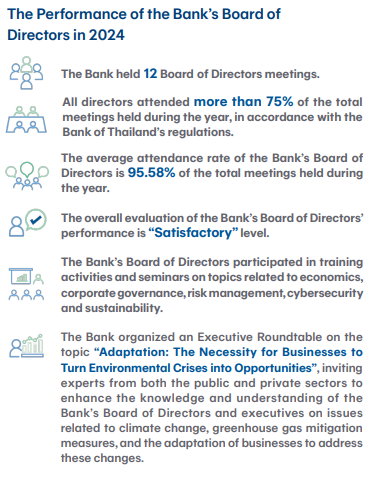Meetings
Each director has the duty and responsibility to attend every Board meeting or at least 75 percent of the meetings held in a year, in accordance with the Bank of Thailand’s regulations. The Bank holds regular Board meetings monthly, and the schedule of meetings for the next calendar year is provided to all directors in advance. The company secretary will notify the directors of the meeting dates for the year, allowing them to allocate time for attendance. The company secretary will also send out the meeting invitations, along with the agenda and supporting documents, to the directors in advance of each meeting, unless the agenda requires urgent attention.
Performance Evaluation
The Bank requires an annual evaluation of the Board of Directors’ performance to provide directors with an opportunity to review their duties over the past year and use the evaluation outcomes to enhance their individual performance as well as increase the effectiveness of the Board of Directors’ overall performance. The evaluation consists of two methods:
- Self-assessment: an assessment of the Board of Directors’ collective performance and each director’s individual performance.
- Cross-assessment: an assessment of other directors’ individual performance.
The Company Secretary is responsible for distributing and collecting the evaluation forms, then submitting them to the Nomination and Remuneration Committee for compiling, summarizing and reporting the findings to the Board of Directors for acknowledgement.
Development of Executives
The Bank places great importance on the continuous development of director’s skills and knowledge by supporting all directors in attending training programs that are beneficial to their duties as members of the Bank’s Board of Directors. These include programs such as the Director Certification Program and the Director Accreditation Program offered by the Thai Institute of Directors (IOD). The Bank also encourages directors to participate in training activities and seminars organized by both internal and external agencies to develop their skills and knowledge in various areas that will contribute to the development of the Bank’s business.

Evaluation of the Performance of Duties and the Determination of Remuneration for Senior Executives
The Bank’s Board of Directors is responsible for evaluating the performance of the Executive Chairman and the President, using an assessment form based on the guidelines for the CEO assessment form disseminated by the Stock Exchange of Thailand and approved by the Bank’s Board of Directors. The main evaluation topics cover areas such as leadership, strategy formulation, strategy execution, financial planning and performance, and relationships with the Board of Directors, among others. The Chairman of t h e N o m i n a t i o n a n d Remuneration Committee will inform the Executive Chairman and the President of the evaluation results. The Nomination and Remuneration Committee is responsible for considering and determining the appropriate remuneration for senior executives, including Executive Vice Presidents, Senior Executive Vice Presidents, and the President, for presentation to the Bank’s Board of Directors. Remuneration determination is linked to the Bank’s short-term and long-term performance indicators, as well as each executive’s performance. These include those performance indicators relating to financials, customer, efficiency improvement and development, human resources development, return on assets (ROA), revenue growth, credit growth, asset quality, customer satisfaction, expense management, and performance indicators measuring the Bank’s competitiveness compared to that of other leading financial institutions and companies in Thailand, such as overall return on equity.

